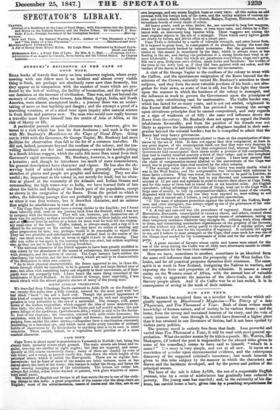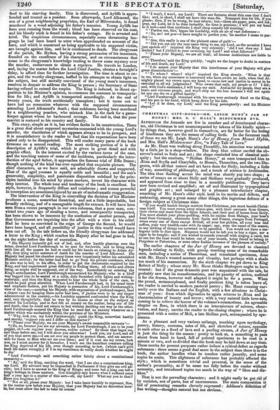NOW AND THEN.
Ma. Weimar{ has acquired fame as a novelist by two works which ori- ginally appeared in Blackwood's Magazine—The Diary of a /ate Physician, and Ten Thousand a Year. Both of them evince much knowledge of human nature, and of society in its various forme ; and the latter, from the strong and sustained interest of its story, and the vein of comic humour that runs through it, would have deserved a higher place than it has attained in our literature of fiction, had it not been spoiled by violent party politics.
The present novel is entirely free from that fault. Less powerful and varied than Ten Thousand a Year, it will be read with more general ap- probation. What the author means by its title is a puzzle. Mr. Warren, like Shakapere, (if indeed the poet is responsible for the absurd titles given to some of his comedies,) seems to have said to himself, "what's in a name ? " 'ET story is very simple, and not at all new. It turns on a conviction of murder upon circumstantial evidence, and the subsequent discovery of the supposed criminal's innocence; but much interest is given to this trite subject by the manner in which the characters are drawn and the incidents developed, and by the power and pathos of the principal scenes.
The hero of the tale is Adam Ayliffe, the son of a respectable English yeoman, who by a series of misfortunes has gradually been reduced to poverty. The young man has married ; and, in the extremity of his die- tress, has carried home a hare, given him by a poaching acquaintance for food to his starving family. This is discovered, and Ayliffe is appre- hended and treated as a poacher. Soon afterwards, Lord Alkmond, the son of a great neighbouring proprietor, the Earl of Milverstoke, is found murdered in a wood adjoining his father's mansion. Young Ayliffe has been seen running from the wood ; blood has been observed on his coat, and his bloody stick is found in his father's cottage. He is arrested and tried. The suspicious circumstances, especially some threatening lan- guage he had been heard to utter when apprehended on account of the bare, and which is construed as being applicable to his supposed victim, are brought against him, and he is condemned to death. The clergyman of the parish, Mr. Hylton, having a strong persuasion of his innocence, founded on the excellence of his character, and on circumstances that come to the clergyman's knowledge tending to throw some mystery over the murder, endeavours to obtain a reprieve. He travels to London, and, laying the matter before the Lord Chief Justice, obtains a fortnight's delay, to afford time for further investigation. The time is about to ex- pire, and the worthy clergyman, baffled in his attempts to obtain light on the subject, but still morally convinced of the young man's innocence, resolves in despair to address the King in person ; the Secretary of State having refused to extend the respite. The King is induced, in direct op- position to his Minister's opinion, to commute the sentence to transporta- tion for life; and Ayliffe is transported accordingly. At the end of twenty years, the truth accidentally transpires; but it turns out to have had no connexion whatever with the supposed circumstances attending Lord Alkmond's death ; that nobleman having been murdered by a neighbouring poacher, who mistook him in the dark for a game- keeper against whom he harboured revenge. The end is, that the poor convict is restored to his country and family.
This story, simple as it is, has evident faults in its construction. There is a great deal about supposed mysteries connected with the young Lord's murder, the elucidation of which appears always to be in prospect, and it is unsatisfactory to the reader to find that his expectations have been raised only to be disappointed. This will render many parts of the book tiresome on a second reading. The most striking portion of it is the description of Ayliffe's trial, which is given in great detail and with graphic effect. In the interest excited by the various turns of the case, and the touching nature of some of the incidents, particularly the intro- duction of the aged father, it approaches the famous trial of Effie Deans; though nothing of the kind has ever equalled that exquisite picture. The chief characters, as we have said, are admirably drawn and supported. That of the aged yeoman is equally noble and beautiful ; and the son's generosity, simplicity, and passionate disposition subdued by the prin- ciples instilled into his mind by pious nurture, invest his character with deep interest. The whole tone and tendency of the book is excellent. Its style, however, is frequently diffuse and cumbrous ; and scenes powerful in conception are sometimes injured by an air of melodramatic exaggeration.
The intervention of the King in controlling the decision of his Minister produces a scene, somewhat theatrical, and not a little improbable, but broadly striking, and of a manageable length for extract. It will have been seen from a recent paragraph in our own columns, that a poor man, con- victed two years ago of stealing a horse, and consequently transported, has been shown to be innocent by the confession of another person, and that Government are inquiring into the affair with a view to his relief. Had he been so convicted in the reign of George the Second, he would have been hanged, and all possibility of justice in this world would have been cut off. In the tale before us, the friendly clergyman has addressed a letter to the King ; which reaches his Majesty after he had gone to bed, on the night before the day of execution. " His Majesty instantly got out of bed, and, after hastily glancing over the letter, directed Lord Farnborough to be sent for forthwith, and to bring along with him all the papers he had or could lay his hands on relating to Adam Ay- liffe, then lying under sentence of death for the murder of Lord Alkmond. His Majesty had paced his chamber many times very impatiently. before his astonished Minister arrived; for the latter had had to go from his private residence, where he also was in bed, to his office, in order to get the documents required by the King, and had experienced great difficulty in finding them; all clerks and others being, as might well be supposed, out of the way. Immediately on entering the King's antechamber, Lord Farnborough encountered his Majesty; who in a bluff way begged him to be seated at a table, duly furnished with lights and writing- materials; and then the King requested to hear the whole facts of the case, to which he paid great attention. When Lord Farnborough had, in his usual terse and emphatic fashion, put his Majesty in possession of his, Lord Farnborough's, view of the case,—assunng his Majesty, with expressions of profound respect, that a clearer case for hanging there never had been, if justice were to be any longer administered in the country,—his Lordship appeared confounded when the King said, very thoughtfully, that he was by no means so clear on the subject as seemed his Lordship, and in fact felt so uneasy on the matter, being one of life and death, that he could not return to bed without deciding one way or the other. Lord Farnborough assured the King that he need feel no anxiety whatever on a matter which was exclusively within the province of his Ministers.
" Why, look you, my Lord Farnborough,' quoth the King, somewhat hastily and sternly, suppose you and I differ on this matter?' " ' Please Four Majesty, we are your Majesty's sworn responsible servants'-
"„' So, so, because you are my servants, my Lord Farnborough, I am to be your puppet, eh ?—to register your decrees, note= volens I By those that begot me, and those before me, but 1 will show you otherwise! Look you, my Lord, and all of you that serve me,—I am set over my people to protect them, and am answer- able for them to Him who set me over them; and if it cost me my crown, look you, as I must answer for it hereafter, I won't see the humblest creature calling me King deprived of his life, even though according to law, (which can't give back life taken wrongly,) if I in my conscience do verily doubt whether he ought to die.'
" Lord Farnborough said something rather faintly about a constitutional monarchy- " Ay, said the King, catching the word, 'but I am also a conscientious king, my Lord. My advisers may be impeached in Parliament if they give me evil ad- vice; but I have to answer to the King of Kings; and none but a king can tell a king's feelings in these matters. God Almighty only knows what I suffered some half a year ago in a matter of this sort—eh, my Lord? What say you to that? Have you forgotten it?' " ' Not at all, please your Majesty: but I take leave humbly to represent, Sire, in the matter now before your Majesty, that your Majesty has no discretion here- in, but must allow the law to take its course. " ' I won't, I won't, my. Lord! There are features about this case that I don't like; and, in short, I shall not have this man die. Transport him for life, if you please; then, if we be wrong, he may return; but—there are paper, pens, and ink; pray, my Lord, let it be done instantly, for time is precious; I will pat my hand to it now—and then methinks I shall sleep soundly till morning.'
" Pardon me, Sire,' began his Lordship, with an air of vast deference-
" 'No, no! not you--I have nought to pardon you; 'tis another I mean to par- don '—
" Sire, this really is one of the plainest cases of guilt'- "' Did you not say the very same thing to me, my Lord, on the occasion I have just spoken of?' inquired the King very solemnly; did I not then say I had doubts? but I yielded to your certainty, my Lord! and what followed?' " Please your Majesty, we are all frail; all human institutions are liable to error.'
" ' Therefore,' said the King quickly, ' ought we the longer to doubt in matters of life and death, my Lord.' " 'I do assure your Majesty that this interference of your Majesty will give great dissatisfaction'— To whom ? where? why?' inquired the King sternly. What is that to me, when my conscience is concerned who have sworn an oath, when God Al- mighty placed my crown upon my head, to cause law and justice in mercy to be executed in all my judgments? Who swore that oath, my people or I? I did; and, with God's assistance, I will keep my oath. Andes for my people, they are a brave and virtuous people, and won't obey me the less because I will not again let any one die on a gibbet hastily.'
"Lord Farnborough remained with his eyes very seriously fixed on the King, and his pen in his hand, which hung down by his side. "'Let it be done, my Lord,' said the King peremptorily: and his Minister obeyed."
























 Previous page
Previous page